- Home
- David McCullough
John Adams Page 4
John Adams Read online
Page 4
“Oh! that I could wear out of my mind every mean and base affectation, conquer my natural pride and conceit.”
Why was he constantly forming yet never executing good resolutions? Why was he so absent-minded, so lazy, so prone to daydreaming his life away? He vowed to read more seriously. He vowed to quit chewing tobacco.
On July 21, 1756, he wrote:
I am resolved to rise with the sun and to study Scriptures on Thursday, Friday, Saturday, and Sunday mornings, and to study some Latin author the other three mornings. Noons and nights I intend to read English authors... I will rouse up my mind and fix my attention. I will stand collected within myself and think upon what I read and what I see. I will strive with all my soul to be something more than persons who have had less advantages than myself.
But the next morning he slept until seven and a one-line entry the following week read, “A very rainy day. Dreamed away the time.”
There was so much he wanted to know and do, but life was passing him by. He was twenty years old. “I have no books, no time, no friends. I must therefore be contented to live and die an ignorant, obscure fellow.”
That such spells of gloom were failings in themselves, he was painfully aware, yet he was at a loss to know what to do about it. “I can as easily still the fierce tempests or stop the rapid thunderbolt, as command the motions and operations of my own mind,” he lamented. Actual thunderstorms left him feeling nervous and unstrung.
By turns he worried over never having any bright or original ideas, or being too bright for his own good, too ready to show off and especially in the company of the older men in the community who befriended him.
“Honesty, sincerity, and openness, I esteem essential marks of a good mind,” he concluded after one evening's gathering. He was therefore of the opinion that men ought “to avow their opinions and defend them with boldness.”
Vanity, he saw, was his chief failing. “Vanity, I am sensible, is my cardinal vice and cardinal folly,” he wrote, vowing to reform himself.
By “vanity” he did not mean he had an excessive pride in appearance. Adams was never one to spend much time in front of a mirror. Rather, in the eighteenth-century use of the word, he was berating himself for being overly proud, conceited.
“A puffy, vain, conceited conversation never fails to bring a man into contempt, although his natural endowments be ever so great, and his application and industry ever so intense.... [And] I must own myself to have been, to a very heinous degree, guilty in this respect.”
By late summer of 1756 Adams had made up his mind about the future. On August 21, he signed a contract with a young Worcester attorney, James Putnam, to study “under his inspection” for two years. The day after, a Sunday, inspired by a sermon he had heard—and also, it would seem, by a feeling of relief that his decision not to become a minister was at last resolved—he wrote of the “glorious shows” of nature and the intense sensation of pleasure they evoked. Beholding the night sky, “the amazing concave of Heaven sprinkled and glittering with stars,” he was “thrown into a kind of transport” and knew such wonders to be the gifts of God, expressions of God's love. But greatest of all, he wrote, was the gift of an inquiring mind.
But all the provisions that He has [made] for the gratification of our senses... are much inferior to the provision, the wonderful provision that He has made for the gratification of our nobler powers of intelligence and reason. He has given us reason to find out the truth, and the real design and true end of our existence.
To a friend Adams wrote, “It will be hard work, but the more difficult and dangerous the enterprise, a higher crown of laurel is bestowed on the conqueror.... But the point is now determined, and I shall have the liberty to think for myself.”
He changed lodgings, moving in with lawyer Putnam, and while continuing his daytime duties at the Worcester schoolhouse, he read law at night moving fast (too fast, he later thought) through Wood's four-volume Institute of the Laws of England, Hawkins's Abridgment of Coke's Institutes, Salkeld's hefty Reports, Coke's Entries, and Hawkins's massive two-volume Pleas of the Crown in a single volume that weighed fully eight pounds. “Can you imagine any drier reading?” he would one day write to Benjamin Rush, heavily underscoring the question.
Putnam's fee was $100, when Adams could “find it convenient.” With the war continuing, much the greatest excitement in Worcester was the arrival of Lord Jeffrey Amherst and 4,000 of the King's troops on their way west to Fort William Henry on Lake George. They camped on a nearby hill and for several days and nights life in the town was transformed. Writing more than half a century later, Adams could still warm to the memory.
The officers were very social, spent their evenings and took their suppers with such of the inhabitants as were able to invite, and entertained us with their music and their dances. Many of them were Scotchmen in their plaids and their music was delightful. Even the bagpipe was not disagreeable.
“I then rejoiced that I was an Englishman, and gloried in the name of Britain,” he would recall to a friend. How he might fare in the law was another matter. As he wrote at the time, “I am not without apprehensions.”
• • •
IN THE FALL OF 1758, his studies with Putnam completed, Adams returned to Braintree to move in with his father and mother again after an absence of eight years. “I am beginning life anew,” he jubilantly informed a Harvard classmate.
He was busy catching up with old friends, busy with his share of the farm work and preparing for admittance to the bar. For the first time, he was on his own with his studies, and he bent to them with the spirit of independence and intense determination that were to characterize much of his whole approach to life. In his diary he wrote of chopping wood and translating Justinian, with equal resolution.
“I have read Gilbert's first section, of feuds, this evening but I am not a master of it,” he recorded October 5, referring to Sir Geoffrey Gilbert's Treatise of Feudal Tenures. “Rose about sun rise. Unpitched a load of hay. Translated two leaves more of Justinian... and am now reading over again Gilbert's section of feudal tenures,” he wrote the day following, October 6. October 7: “Read in Gilbert...” October 9: “I must and will make that book familiar to me.” October 10: “Read in Gilbert. I read him slowly, but I gain ideas and knowledge as I go along.” October 12: “This small volume will take me a fortnight, but I will be master of it.”
Though full of opinions, he often found himself reluctant to express them. “I was young, and then very bashful, however saucy I may have sometimes been since,” he would recall long afterward to Thomas Jefferson.
Feeling miserably unsure of himself, he attended court in Boston, where, awestruck, he listened to the leading attorneys of the day, Jeremiah Gridley and James Otis, argue cases. But, as he explained to a friend in Worcester, the appeal of Boston was threefold.
I had the pleasure to sit and hear the greatest lawyers, orators, in short the greatest men in America, haranguing at the bar, and on the bench. I had the pleasure of spending my evenings with my Harvard friends in the joys of serene, sedate conversation, and perhaps it is worth my while to add, I had the pleasure of seeing a great many and of feeling some very [pretty] girls.
On the morning he found his way through the crooked streets of Boston to Jeremiah Gridley's office for the requisite interview for admission to the bar, Gridley, much to Adams's surprise, gave him not a few cursory minutes but several hours, questioning him closely on his reading. With a kindly, paternal air, Gridley also counseled him to “pursue the study of the law itself, rather than the gain of it,” and not to marry early.
Adams was admitted to the bar in a ceremony before the Superior Court at Boston on November 6, 1759, and in a matter of weeks, at age twenty-four, he had taken his first case, which he lost.
In Braintree, as elsewhere in New England, much of town business was taken up with the commonplace problem of keeping one man's livestock out of another man's fields, and by long-standing custom most
legal matters were handled by town clerks and officials who, though without legal training, were thoroughly schooled in procedure, knowing to the last detail all that was required for writs and warrants, matters about which, for all his reading, Adams knew little. The case Lambert v. Field involved two horses belonging to Luke Lambert, a coarse, cocksure man whom Adams did not like. Lambert's horses had broken into the enclosure of a neighbor, Joseph Field, and trampled some crops. When Lambert crossed onto Field's land to retrieve them, Field called for him to stop, but Lambert, as Adams noted, “waved his hat and screamed at the horses and drove away, without tendering Field his damages.”
As counsel for Field, the plaintiff, Adams felt confident in his understanding of the principles of law involved, but worried that the writ he prepared was “unclerklike” and thus he would fail. He had had no experience in preparing such a document. His anguish was acute. He blamed Putnam for insufficient training. He blamed his mother for insisting he take the case lest it be thought he was incapable of drawing a writ. Nothing, he decided, would ever come easily to him. “But it is my destiny to dig treasures with my own fingers,” he wrote woefully.
To gather strength, he read aloud from Cicero's Orations. The “sweetness and grandeur” of just the sounds of Cicero were sufficient reward, even if one understood none of the meaning. “Besides ... it exercises my lungs, raises my spirits, opens my pores, quickens the circulation, and so contributes much to health.”
The case was the talk of the village. Everybody knew everybody involved. The justice of the peace, before whom Adams would appear, and the lawyer for Lambert were father and son—Colonel Josiah Quincy and young Samuel Quincy—a circumstance that obviously did not bode well for Adams and his client.
Just as he feared, Adams lost on a technicality. He had neglected to include the words “the county in the direction to the constables of Braintree.”
“Field's wrath waxed hot,” he recorded, and his own misery was extreme. In his first appearance as a lawyer he had been bested by a crude countryman like Lambert. He had been made to look a fool in the eyes of the whole town, and the humiliation and anger he felt appear to have affected the atmosphere at home. The night following, a terrible family row broke out. Susanna Adams flew into a rage over the fact that Deacon John, in answer to his own conscience and feelings of responsibility as selectman, had brought a destitute young woman to live in the crowded household, the town having no means to provide for her. How was the girl to pay for her board, Susanna demanded of her husband, who responded by asserting his right to govern in his own home. “I won't have the town's poor brought here, stark naked for me to clothe for nothing,” she stormed. He should resign as selectman.
When the young woman, whose name was Judah, burst into tears and John's brother Peter pointed this out, Adams told him to hold his tongue, which touched Peter off and “all was breaking into flame.” Adams was so shaken, he had to leave the room and take up his Cicero again in order to compose himself.
His mother's uncontrolled responses, her “scolds, rages,” were a grievous flaw, he felt. He knew the sudden, uncontrollable rush of his own anger, almost to the point of bursting. He must observe more closely the effects of reason and rage, just as he must never again undertake a case without command of the details. “Let me never undertake to draw a writ without sufficient time to examine and digest in my mind all the doubts, queries, objections that may arise,” he wrote. And he never did. The painful lesson had been learned.
Henceforth, he vowed, he would bend his whole soul to the law. He would let nothing distract him. He drew inspiration from his Roman heroes. “The first way for a young man to set himself on the road towards glorious reputation,” he read in Cicero, “is to win renown.” “Reputation,” wrote Adams, “ought to be the perpetual subject of my thoughts, and aim of my behavior.”
Should he confine himself to the small stage of Braintree? Or would he be better off in Boston? But how possibly could anyone with an interest in life keep a clear head in Boston?
My eyes are so diverted with chimney sweeps, carriers of wood, merchants, ladies, priests, carts, horses, oxen, coaches, market men and women, soldiers, sailors, and my ears with the rattle gabble of them all that I can't think long enough in the street upon any one thing to start and pursue a thought.
He felt “anxious, eager after something,” but what it was he did not know. “I feel my own ignorance. I feel concern for knowledge. I have... a strong desire for distinction.”
“I never shall shine, 'til some animating occasion calls forth all my powers.” It was 1760, the year twenty-two-year-old George III was crowned king and Adams turned twenty-five.
But if self-absorbed and ambitious, he was hardly more so than a number of other young men of ability of his time. The difference was that Adams wrote about it and was perfectly honest with himself.
“Why have I not genius to start some new thought?” he asked at another point in his diary. “Some thing that will surprise the world?” Why could he not bring order to his life? Why could he not clear his table of its clutter of books and papers and concentrate on just one book, one subject? Why did imagination so often intervene? Why did thoughts of girls keep intruding?
“Ballast is what I want. I totter with every breeze.”
Chide himself as he would about time spent to little purpose, his appetite for life, for the pleasures of society was too central to his nature to be denied. Further, he had a talent for friendship. To many he seemed prickly, intractable, and often he was, but as his friend Jonathan Sewall would write, Adams had “a heart formed for friendship, and susceptible to the finest feelings.” He needed friends, prized old friendships. He kept in touch with his Harvard classmates, and for several in particular maintained boundless admiration. Moses Hemmenway, who had become a Congregational minister known for his interminable sermons, would remain, in Adams's estimate, one of the first scholars of their generation. Samuel Locke, another from the class, was not only the youngest man ever chosen for the presidency of Harvard, but to Adams one of the best men ever chosen, irrespective of the fact that Locke had had to resign after only a few years in office, when his housemaid became pregnant. With his departure, in the words of one Harvard history, Locke was “promptly forgotten,” but not by John Adams.
“Friendship,” Adams had written to his classmate and cousin, Nathan Webb, “is one of the distinguishing glorys of man.... From this I expect to receive the chief happiness of my future life.” When, a few years later, Webb became mortally ill, Adams was at his bedside keeping watch through several nights before his death.
His current friends—Sewall, Richard Cranch, Parson Anthony Wibird—were to be his friends to the last, despite drastic changes in circumstance, differing temperaments, eccentricities, or politics. When in time Adams became Richard Cranch's brother-in-law, he would sign his letters “as ever your faithful friend and affectionate brother, John Adams,” meaning every word.
There was little he enjoyed more than an evening of spontaneous “chatter,” of stories by candlelight in congenial surroundings, of political and philosophic discourse, “intimate, unreserved conversation,” as he put it. And flirting, “gallanting,” with the girls.
He was lively, pungent, and naturally amiable—so amiable, as Thomas Jefferson would later write, that it was impossible not to warm to him. He was so widely read, he could talk on almost any subject, sail off in almost any direction. What he knew he knew well.
Jonathan Sewall had already concluded that Adams was destined for greatness, telling him, only partly in jest, that “in future ages, when New England shall have risen to its intended grandeur, it shall be as carefully recorded among the registers of the literati that Adams flourished in the second century after the exode of its first settlers from Great Britain, as it is now that Cicero was born in the six-hundred-and-forty-seventh year after the building of Rome.”
Yet Adams often felt ill at ease, hopelessly awkward. He sensed people were laughi
ng at him, as sometimes they were, and this was especially hurtful. He had a way of shrugging his shoulders and distorting his face that must be corrected, he knew. He berated himself for being too shy. “I should look bold, speak with more spirit.” In the presence of women—those he wished to impress above all—he was too susceptible to the least sign of approval. “Good treatment makes me think I am admired, beloved... So I dismiss my guard and grow weak, silly, vain, conceited, ostentatious.”
Determined to understand human nature, fascinated by nearly everyone he encountered, he devoted large portions of his diary to recording their stories, their views on life, how they stood, talked, their facial expressions, how their minds worked. In the way that his literary commonplace book served as a notebook on his reading, the diary became his notebook on people. “Let me search for the clue which led great Shakespeare into the labyrinth of human nature. Let me examine how men think.”
He made close study of the attorneys he most admired, the Boston giants of the profession, searching for clues to their success. Jeremiah Gridley's “grandeur” emanated from his great learning, his “lordly” manner. The strength of James Otis was his fiery eloquence. “I find myself imitating Otis,” wrote Adams.
His portraits of “original characters” in and about Braintree were extraordinary, detailed, full of life and color, and written obviously, like so much of the diary, out of the pure joy of writing. Possibly he knew what a gift he had as an observer of human nature. In another time, under different circumstances, he might have become a great novelist.
That so many disparate qualities could exist in one person was of never-ending fascination to him. He longed to understand this in others, as in himself. The good-natured, obliging landlady of a friend was also a “squaddy, masculine creature” with “a great staring, rolling eye,” “a rare collection of disagreeable qualities.” A tavern loafer of “low and ignoble countenance,” one Zab Hayward of Braintree, who had no conception of conventional grace in dancing or anything else, was nonetheless regarded as the best dancer in town. Adams sat one night in a local tavern observing from the sidelines. “Every room... crowded with people,” he recorded. “Negroes with a fiddle. Young fellows and girls dancing in the chamber as if they would kick the floor through.” When at first Zab “gathered a circle around him ... his behavior and speeches were softly silly, but as his blood grew warm by motion and liquor, he grew droll.

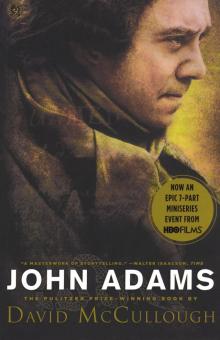 John Adams
John Adams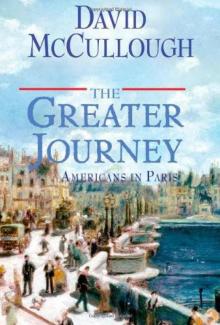 The Greater Journey: Americans in Paris
The Greater Journey: Americans in Paris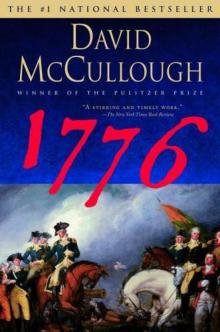 1776
1776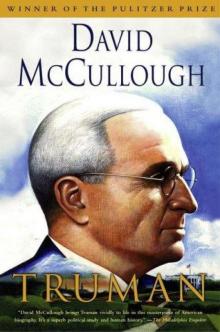 Truman
Truman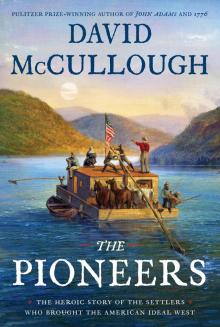 The Pioneers
The Pioneers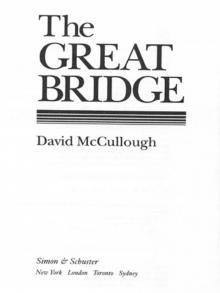 The Great Bridge: The Epic Story of the Building of the Brooklyn Bridge
The Great Bridge: The Epic Story of the Building of the Brooklyn Bridge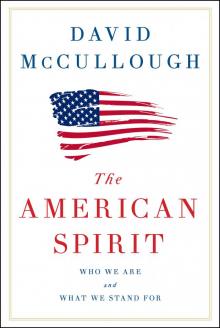 The American Spirit
The American Spirit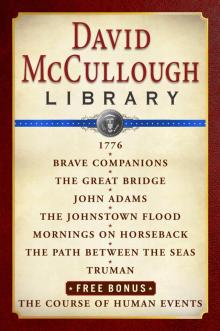 David McCullough Library E-book Box Set
David McCullough Library E-book Box Set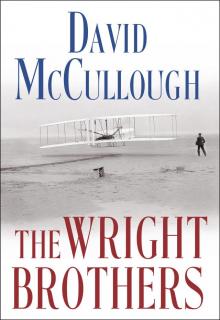 The Wright Brothers
The Wright Brothers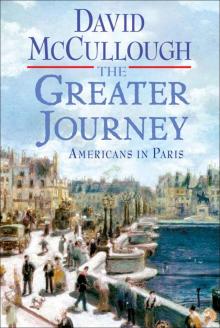 The Greater Journey
The Greater Journey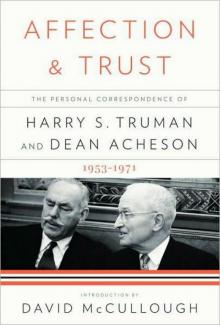 Affection and Trust: The Personal Correspondence of Harry S. Truman and Dean Acheson, 1953-1971
Affection and Trust: The Personal Correspondence of Harry S. Truman and Dean Acheson, 1953-1971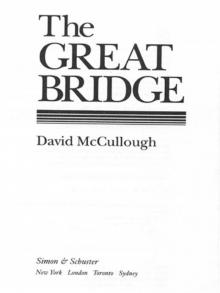 The Great Bridge
The Great Bridge